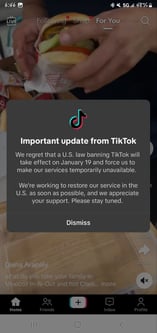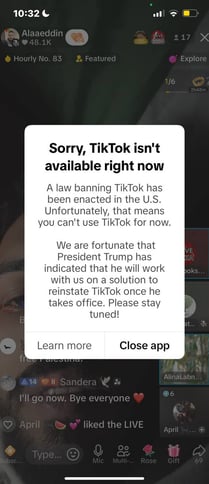The TikTok Ban: More Than Just a Political Move
The TikTok ban is seen by many as a direct attack on American internet users’ freedom of choice. The U.S. government, under former President Donald Trump, claimed national security concerns as the main reason for blocking the platform. But the true motivations behind this decision are far from clear. "The TikTok ban raises critical questions about user data, national security, and the growing dominance of Chinese apps in the U.S." Trump’s administration, often vocal about the threat posed by Chinese tech companies, used national security fears as a justification. Yet, the question remains: why target TikTok while other U.S.-based companies like Meta, Amazon, and Twitter also collect vast amounts of user data?


the TikTok: More Than Just a Political Move















While TikTok was the immediate target, Meta (formerly Facebook), Amazon, and Twitter have played a significant role in pushing for this ban. Meta, which owns Facebook and Instagram, has been struggling to compete with TikTok’s rapid growth in user engagement. How has Meta’s competitive edge been threatened by TikTok? Facebook has long dominated social media, but TikTok’s rise shifted the balance of power, with younger users flocking to the platform for its fresh, entertaining content. Meta has been vocal about concerns regarding TikTok’s data collection practices, but many argue that Meta collects just as much—if not more—user data to fuel its advertising model.
Similarly, Amazon, as one of the largest e-commerce companies in the U.S., faces pressure from growing Chinese platforms like TikTok and Temu. These platforms have quickly gained popularity, attracting a massive user base and creating fierce competition. "For millions of American creators and businesses, the TikTok ban isn’t just a loss of a platform—it’s a threat to their digital livelihood and advertising strategies." Amazon, along with Meta, has found itself caught in this digital battle, fearing the disruption TikTok could cause to their market dominance.
The Impact
on American Users and Content Creators







For millions of American users and creators, the TikTok ban isn’t just an inconvenience—it’s a direct hit to their digital presence and income. TikTok has been a vital tool for creators to grow their audiences, promote products, and even start their own businesses. Do you feel that banning TikTok harms you as a user or content creator? Many TikTok influencers, small businesses, and everyday users built their personal brands and livelihoods on the platform. Now, with the app’s ban, these individuals are left scrambling for alternatives. The reality is that no other platform has been able to replicate TikTok’s user engagement and content discovery system.
Data Privacy and Security Concerns: A Double Standard?
While U.S. officials claim that TikTok poses a security risk by allegedly sharing user data with the Chinese government, the truth is that American companies like Meta and Amazon have been just as aggressive in collecting and monetizing user data. "As the debate over TikTok intensifies, data privacy concerns and global competition are at the heart of this ongoing digital battle." Yet, these same companies, which benefit from the vast amounts of personal data they harvest, have largely remained unchallenged. Why single out TikTok when American companies have similar practices? Could this all be about stifling competition from Chinese platforms?
While national security concerns are often cited, many believe that the TikTok ban is more about protecting American businesses and preserving a digital monopoly. By targeting TikTok, former President Trump and companies like Meta, Amazon, and Twitter could be trying to control the flow of user data and digital influence in the U.S.
Is the TikTok Ban a Form
of Digital Censorship?


The decision to ban TikTok has sparked outrage among millions of American users, creators, and businesses. With the platform offering new opportunities for creativity, business growth, and personal expression, its removal from the digital landscape feels like a significant loss. However, the ban is also a stark reminder of the growing influence of powerful corporations and political entities in shaping our digital experiences. Whether driven by national security, competitive pressure, or something more insidious, the TikTok ban highlights the need for greater transparency and accountability in how user data is handled by all platforms, both American and foreign.
In the end, it’s not just about TikTok. It's about the future of digital freedom, the right to choose our platforms, and how we, as users, engage with the digital world. Will the U.S. government continue to prioritize national security over personal choice? Or will we demand a digital space where competition thrives and data privacy is protected for all?


